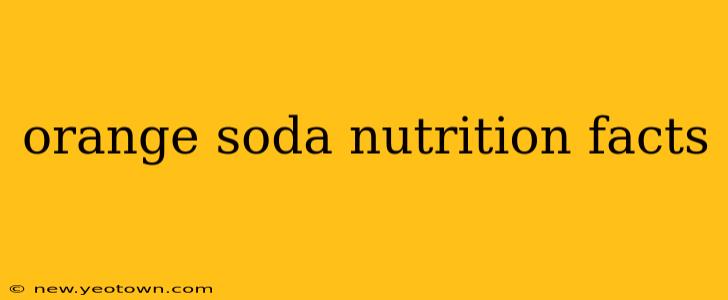Orange soda. That vibrant, bubbly burst of citrusy sweetness that's been a summertime staple for generations. But beyond the refreshing taste, what's really in that can? Let's dive deep into the nutrition facts of orange soda, exploring its ingredients, potential health implications, and answering some frequently asked questions.
Imagine a sweltering summer day. You crack open a cool can of orange soda, the fizz tickling your nose as you take that first, invigorating sip. That's the magic of orange soda, a simple pleasure with a surprisingly complex nutritional profile.
What are the main ingredients in orange soda?
The core ingredients typically include carbonated water, high-fructose corn syrup (or sugar), citric acid for that tangy orange flavor, natural and artificial flavorings (often including oils from orange peels), and coloring agents like caramel color. Some brands might also include preservatives, phosphoric acid (which contributes to the tartness), and caffeine. The exact blend varies depending on the brand, but this provides a general overview. It's crucial to check the specific nutritional label of the brand you're consuming.
How many calories are in a can of orange soda?
This is highly variable, depending on the brand and can size. A typical 12-ounce can might contain anywhere from 140 to 170 calories, but some larger sizes can significantly exceed this. Calories largely come from the sugars, primarily high-fructose corn syrup or sugar.
How much sugar is in a can of orange soda?
Again, this is brand-dependent, but expect a substantial amount. A 12-ounce can can easily contain 35-45 grams of sugar, which is a significant portion of your daily recommended sugar intake. Remember, the American Heart Association recommends no more than 25 grams of added sugar per day for women and 36 grams for men.
Is orange soda bad for your teeth?
The high sugar content in orange soda significantly contributes to tooth decay. The sugar feeds the bacteria in your mouth, producing acids that erode tooth enamel. The acidity of the soda itself also contributes to this erosion. Regular consumption of orange soda significantly increases your risk of cavities and other dental problems.
What are the health risks associated with drinking orange soda?
Beyond dental issues, excessive consumption of orange soda is linked to several health concerns:
- Weight gain: The high calorie and sugar content contributes to weight gain and obesity.
- Type 2 diabetes: The high sugar intake can increase the risk of developing type 2 diabetes.
- Heart disease: High sugar consumption is linked to increased risk factors for heart disease.
- Metabolic syndrome: This cluster of conditions (high blood pressure, high blood sugar, excess body fat around the waist, and abnormal cholesterol or triglyceride levels) is often associated with high sugar intake.
Does orange soda contain any vitamins or minerals?
While some brands might fortify their sodas with added vitamins, the amounts are typically minimal and don't offset the negative impacts of the high sugar and calorie content. Don't rely on orange soda as a source of essential nutrients.
Are there healthier alternatives to orange soda?
Absolutely! Consider these options:
- Water: The healthiest choice, plain and simple.
- Unsweetened iced tea: Provides hydration and antioxidants.
- Sparkling water with a squeeze of orange: The fizz satisfies the craving without the sugar overload.
- Fruit-infused water: Add slices of oranges and other fruits for a refreshing, naturally sweet drink.
Orange soda can be an occasional treat, but it's crucial to be mindful of its nutritional content and to limit consumption for optimal health. Understanding the facts empowers you to make informed choices about your beverages and maintain a balanced diet. Remember, moderation is key!

